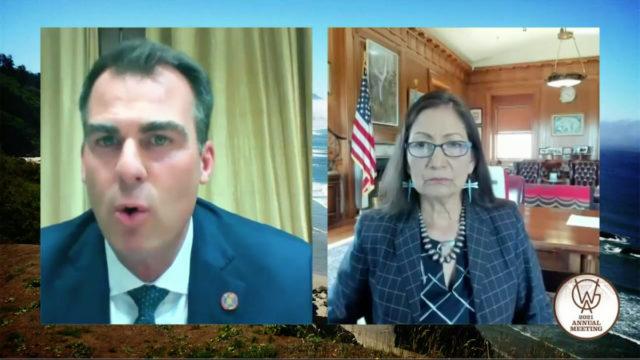
Gov. Kevin Stitt and the state of Oklahoma have filed a lawsuit against the U.S. Department of the Interior and Secretary of the Interior Deb Haaland for “unlawfully attempting to strip Oklahoma of its jurisdiction to regulate surface coal mining and reclamation operations,” according to a Monday morning press release from Stitt’s office.
The U.S. Office of Surface Mining Reclamation and Enforcement added a notice to the Federal Registry on May 18 that notified Oklahoma of its loss of surface coal mining jurisdiction within the reservation bounds of the Muscogee Nation, and by extension, the Cherokee Nation, Choctaw Nation, Chickasaw Nation and Seminole Nation. That notice designates the federal agency as having regulatory authority over surface coal mining and reclamation operations on Indian lands when a tribe has not requested and obtained primacy.
Now, Stitt and a pair of executive-branch state agencies — the Oklahoma Department of Mines and the Oklahoma Conservation Commission — have filed suit in U.S. District Court for the Western District of Oklahoma asking that a judge declare the OSMRE notice “unlawful” and that the U.S. Supreme Court decision in McGirt v. Oklahoma “does not apply outside of the limited context” of criminal jurisdiction.
“The Department of the Interior and other defendants in this case are dead wrong about their decision,” Stitt said in his release. “They are attempting to unlawfully federalize mines that have been regulated by Oklahoma for almost 40 years by ignoring the clear limitations in the McGirt decision. Despite multiple attempts at dialogue, the Biden Interior Department has refused to adequately explain their legal position. The state of Oklahoma has no choice but to pursue legal action.”
The surface mining notice and litigation from the state continue the legal aftermath of the July 2020 SCOTUS ruling in McGirt v Oklahoma, which affirmed the Muscogee Nation to be an Indian Country reservation as defined under 18 U.S.C. 1151a. Subsequently, an Oklahoma appellate court issued rulings that the SCOTUS decision applied to the Cherokee Nation, Choctaw Nation, Chickasaw Nation and Seminole Nation.
However, while the SCOTUS majority decision on its face concerned jurisdiction over major crimes that occur on tribal lands, the justices’ affirmation of the 18 U.S.C. 1151a reservation designation potentially has numerous implications over property rights and regulations, which includes jurisdiction for surface mining.
Stitt’s press release called the surface mining situation an “erroneous expansion” of the SCOTUS decision.
Tyler Cherry, press secretary for the Interior Department, told NonDoc that the federal agency had no statement response to Oklahoma’s lawsuit.
‘Jurisdiction over Indian land’
Following last week’s contentious McGirt v. Oklahoma community impact forum, Stitt criticized the SCOTUS ruling’s expansion from criminal jurisdiction into civil issues, including the surface mining question.
RELATED
Federal notice on surface coal mining a ‘significant loss of power by Oklahoma’ by Joe Tomlinson
“You can see it already bleeding into other things with the Department of the Interior,” Stitt told NonDoc. “The Biden Administration has already overreached (and) said Oklahoma doesn’t have the right to [interpret regulatory laws for] mines in eastern Oklahoma.”
On June 30, during the Western Governors’ Association annual meeting, a pre-recorded exchange between Stitt, other governors and Haaland aired. Stitt asked Haaland to explain how the SCOTUS decision shifted from criminal matters to civil matters, like surface mining jurisdiction.
Haaland said she appreciated the question.
“I know it is a concern for you, and I hope that my staff here at the department have reached out to your office, and I know that we want to continue to work with the state of Oklahoma during this transition,” Haaland said. “What I can tell you today is that, based on legal advice, we are moving forward to ensure that the the Office of Surface Mining will exercise their jurisdiction over Indian land. I know that’s not an answer you want to hear today. I am more than happy to make sure that the folks in that office reach out to you, that they are having conversations to answer your questions, and I promise you that we can be in touch.”
Stitt lawsuit against U.S. Department of the Interior
 Loading...
Loading...
(Update: This article was updated at 3 p.m. Monday, July 19, to note that an Interior Department official declined to comment about the lawsuit.)






















